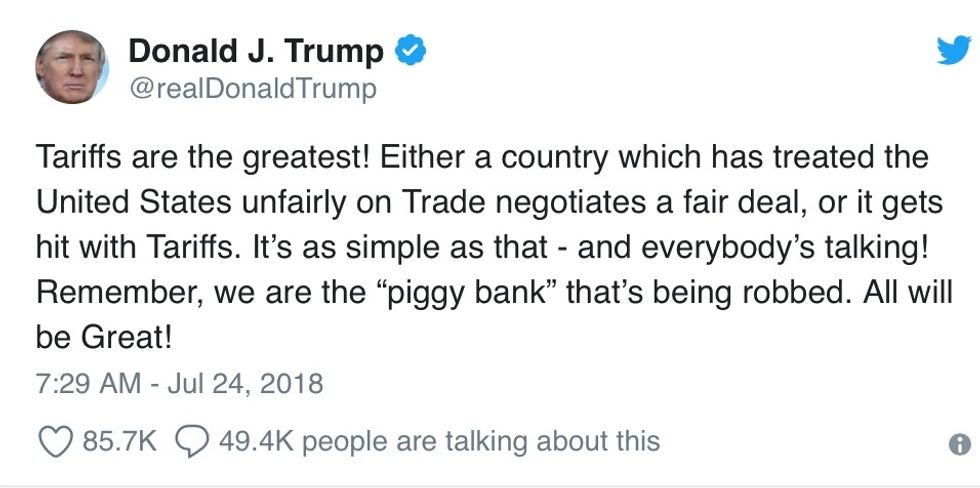A $12 billion farm bailout will not undo the damage the administration's incoherent policies are doing to American industry and workers.
Scrambling to soften the blow of his destructive trade wars, President Trump is offering a $12 billion bailout for farmers facing retaliation from America's trading partners hurt by histariffs. It's a desperation move, and it won't do much to reverse the damage the administration has inflicted by senselessly raising duties on steel, aluminum and other imports from Canada, Mexico, the European Union, China and elsewhere.
Mr. Trump's tariff increases were never needed in the first place. Indeed, the plan to pay off farmers — theoretically, voters in many of the president's political strongholds — is the latest in a series of incoherent and haphazard economic decisions that the Trump administration has made in recent months, often in an attempt to clean up after it failed to think through the consequences of its earlier actions. In retaliation for Mr. Trump's tariffs, China, the European Union, Mexico and other countries quite predictably imposed tariffs on soybeans, corn, pork and other products, and so — equally predictably — demand, and therefore prices, dropped for these commodities. The agriculture sector is understandably upset. But a one-time payment is no way to fix this problem the president created.
That's why even lawmakers from farm states don't like the president's approach of using a Depression-era program known as the Commodity Credit Corporation to help farmers. Senator Ben Sasse, Republican of Nebraska, likened the plan to spending "$12 billion on gold crutches." He added, "This administration's tariffs and bailouts aren't going to make America great again; they're just going to make it 1929 again." In April, after the administration floated the idea of helping farmers hurt by foreign tariffs, Senator Pat Roberts, the Kansas Republican who heads the agriculture committee, told reporters, "We don't need another subsidy program; we need to sell our product."
Mr. Trump's decision to pay farmers could run afoul of commitments the United States has made at the World Trade Organization not to unfairly subsidize its agricultural sector. That could give other countries, which will now be worried that their farmers will be at a competitive disadvantage, a reason to further retaliate against the United States. Countries have often fought about agriculture subsidies. For example, the Obama administration accused India of unfairly subsidizing its farmers, and Brazilhas long complained about American farm programs.
The Trump administration's plan to rush taxpayer money to farmers it is hurting could also prompt other domestic industries hurt by the president's trade wars to demand bailouts. Why shouldn't manufacturing companies and other businesses ask to be made whole for having to pay higher prices for steel and aluminum after Mr. Trump raised tariffs on those metals? What about the workers at Harley-Davidson who will lose their jobs when the company moves some production overseas to avoid the European Union's retaliatory tariffs on American motorcycles? And surely the administration is distressed by the plight of bourbon producers in Kentucky and Tennessee that have also been subject to higher tariffs from the Europeans?
On Tuesday afternoon lawmakers were already pointing out the administration's disparate treatment of industries that have been hurt by Mr. Trump's trade wars. Senator Lisa Murkowski, Republican of Alaska, identified two that are important to her state: seafood and energy. "I have a seafood industry up north that is not considered to be farmers," she said. "We're farmers of the sea."
The list of industries seeking help from the government could ultimately end up including much of the American economy if Mr. Trump carries out his threats to impose even more tariffs. In recent days he has threatened to impose new tariffs against all $500 billion of imports from China and against European cars. (The president of the European Commission, Jean-Claude Juncker, will visit Washington on Wednesday in an effort to persuade the administration not to impose those tariffs.)
"Tariffs are the greatest!" Mr. Trump tweeted early Tuesday morning. In March, he wrote that "trade wars are good, and easy to win."
The plan to help farmers reveals instead that trade wars are complicated and difficult. Yes, the American piggy bank is now being robbed — but it's the president and his aides who are raiding it, to cover up the costs of policies they still show little sign of understanding.
July 24, 2018 New York Times Editorial.
###
July 25, 2018
Post Script. Tariffs aren't a game,tho the out-of-control toddler in the WH thinks so. Trump is crazy, ignorant, mean, racist..and yes, a #would-be-Putin. Did I mention he is stupid? Now how do I really feel! How do you feel? Diminish his power. Register. Get others registered. Vote. #Midterms2018


